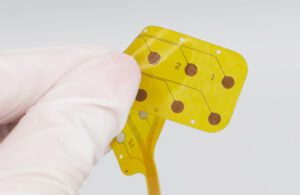
NeuroOne’s thin-film electrode, with a gloved thumb for scale [Photo courtesy of NeuroOne]
NeuroOne Medical Technologies (NSDQ:NMTC) today reported successful results of aging tests demonstrating long-term durability of its thin-film electrodes.
Eden Prairie, Minnesota-based NeuroOne said in a news release that the electrodes’ ability to record electrical activity was tested using an accelerated soak tests that simulated the passage of 5 years. The results show the electrodes can withstand environmental factors that cause thin-film electrode failures and malfunctions.

NeuroOne CEO Dave Rosa [Photo courtesy of NeuroOne]
“These results support the potential expansion of utilization of these electrodes for long-term recording for indications such as epilepsy, Parkinson’s disease, chronic back pain due to failed back surgeries, other related neurological disorders as well as research applications,’ NeuroOne CEO Dave Rosa said in the news release. “We also believe that in the near term it may provide an opportunity to enter the research market as well as offering the potential for strategic licensing agreements in certain markets.”

NeuroOne’s thin-film electrodes [Photo courtesy of NeuroOne]
Camilo Diaz-Botia, director of electrode development for NeuroOne, said there are many known failure modes of chronically implantable electrodes.
“For thin-film devices in particular, reliable insulation is an important challenge because reduction of the amount of material puts electrical signals of interest closer to detrimental factors like moisture, corrosion, and noise, which may contribute to device malfunction or failure,” Diaz-Botia said in the news release. “For all the tests performed at different acceleration factors, our devices demonstrated reliable insulation, as determined by electrochemical characterization methods, beyond 5 years of real-time use, solving one of the most significant failure modes of thin-film electrodes.”
NeuroOne is developing therapeutic electrode technologies for brain tissue ablation, deep brain stimulation, and spinal cord stimulation for chronic back pain, estimating the market for the technology at more than $10 billion.